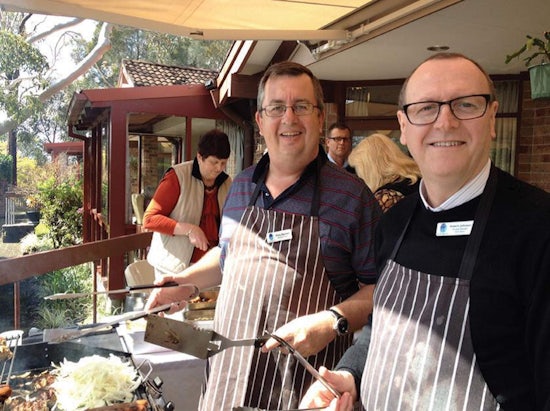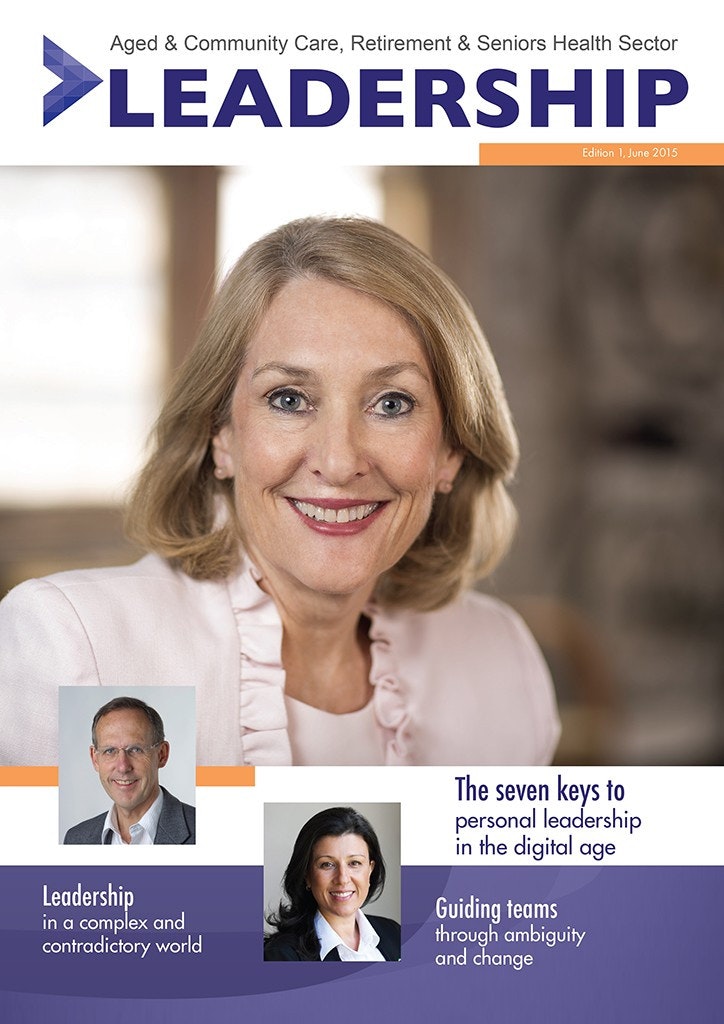Leaders make a difference in aged care
Aged care professionals looking to make a difference in their organisation are urged to register for the Aged Care Leaders Symposium, co-hosted by the publishers of DPS News – DPS Publishing, at the end of this month.

Gary Barnier, left, managing director of Opal Aged Care, with Robert Johnson, regional manager of NSW Metro at the Opal Lourdes welcome BBQ last year.
Aged care leaders across the country will attend to discuss the secrets to their success as quality service providers to older Australians.
‘Leading’ the way to quality care
One such example of an aged care provider possessing inspirational leadership skills is Opal Aged Care.
Heidi Williams, Editor of a new DPS Publishing publication, Leadership, writes about Opal Aged Care’s Managing Director, Gary Barnier, philosophy on being a ‘great’ leader.

The below article features in Edition 1 of the Leadership magazine.
Once a month the leader of one of Australia’s leading aged care providers stays at one of its homes. He has meetings with the staff and residents, cooks them a barbecue, spends the night interacting with staff and in the morning breakfasts with the residents.
This is part of Gary Barnier’s philosophy of being a great leader and building a team of staff to help achieve the business’s goals.
Mr Barnier is Managing Director of Opal Aged Care. He firmly believes that a leader’s role is to support and coach a group of people to achieve a common goal, and he practices this philosophy daily.
He says the main characteristic of a good leader is to be a good coach. “Just like a captain is head of the footy team, it needs a good coach to get the best out of its people by identifying areas of development and working on the dynamics of the team.
“Leadership is a team effort. You can’t achieve great things on your own. But you can achieve great change and goals with a team,” Mr Barnier says.
In the four years since he took over as Managing Director of Opal, Mr Barnier has built a dynamic group of executives through personal development and support of his staff.
Staff turnover is now 17%, down from over 33%. But his aim is to reduce that percentage further to 15%. Staff remain at Opal for six years on average. “We have built a culture where people want to stick with us.”
Mr Barnier says the three main issues facing the aged care sector are how to make your business sustainably competitive, how to attract people to work for you, and to pay a fair wage.
He explains that it is a leader’s job to focus on how to make their business more competitive, and sustainably competitive. “You need to work out how your business will be different.” For Opal it was providing an affordable high quality product.
One of those differences at Opal is their delivery of service within the business. It is all about how the company’s staff can make it easier for the resident and their family, for example, when they first enter one of their homes.
It is also important to attract people to work for you. Mr Barnier does this by sharing Opal’s vision with the staff. That vision is to provide quality high care for middle Australians.
He says that in aged care especially, people need to be supported for three reasons.
Firstly, it’s a tough job, but it’s also rewarding. “People need leaders to recognise that they need to be looked after.”
Secondly, the industry is constantly changing, therefore staff need to know they’re supported.
Thirdly, families have so much guilt when they place a loved one into aged care and they share that with the staff. They (staff) need to know that their leaders are listening to them.
“Staff want bosses who listen and act on their needs. We have monthly forums at each of our homes,” Mr Barnier explains.
So how does he divide up the remaining 75% of his time, when he isn’t staying at one of Opal’s homes?
“A quarter of my time is spent on industry issues, dealing with government, peak bodies and other providers discussing policy matters and what the industry needs.
“Twenty five per cent of my time is devoted to strategy. What new services do we (Opal) need, and how to make the experiences of our residents and families better.”
And the final 25% of time Mr Barnier spends helping management achieve their goals.
“A good team is essential,” he says.























